AhlulBayt News Agency: Eid al-Adha is one of the greatest Muslim festivities falling on the tenth day of the lunar Hijri month of Dhual Hajjah.
On the day of Eid, the Hajj pilgrims perform the ritual of animal sacrifice, after which many of the things that were Haram (forbidden) during the state of Ihram, such as looking in the mirror, trimming nails, and combing hair, will become Halal (permissible) for the pilgrims.
Eid al-Adha is a reminder of the divine test for Prophet Abraham (AS) and his son Ismail (AS) who successfully passed it. The tradition of animal sacrifice is a reminder of Abraham’s sacrifice of Ismail.
According to Islamic Hadiths, Abraham had a son in his old age, and he named him Ismail and cherished him. When Ismail become a young adult, God ordered Abraham to sacrifice Ismail by slaughtering him with a knife. When Ismail learned about the divine command, he accepted to be sacrificed on the path of God, However, when Ibrahim put the knife on Ismail’s throat, a ram was provided by God and it was sacrificed instead.
This story is mentioned in Verses 103-105 of Surah Saffat of the Holy Quran:
“When they both agreed and Abraham had lain down his son on the side of his face (for slaughtering), We called to him, ‘Abraham, you have fulfilled what you were commanded to do in your dream." Thus do We reward the righteous ones.”
This obedience of Abraham to God and his willingness to do what God told him to do has become a ritual for Hajj pilgrims to sacrifice an animal on the day of Eid al-Adha to provide meat and food for orphans and the poor.
During the era of Jahilliyah (before the advent of Islam), the tradition of animal sacrifice was tainted with Shirk (polytheism). They would defile the Kaaba with the blood of the animal and place the meat on the Kaaba for God to accept. The Quran says in Verse 37 of Surah Hajj: “It is not the flesh and blood of your sacrifice that pleases God. What pleases God is your piety.” So the Quran introduces Taqwa (piety, God-fearing) as a prerequisite for the sacrifice to be accepted by God.
In many Hadiths, Muslims have been urged to sacrifice a lamb, camel or ram, wherever they are, to provide food for the destitute. Over the years, this has helped to strengthen unity among Muslims.
/129
On the day of Eid, the Hajj pilgrims perform the ritual of animal sacrifice, after which many of the things that were Haram (forbidden) during the state of Ihram, such as looking in the mirror, trimming nails, and combing hair, will become Halal (permissible) for the pilgrims.
Eid al-Adha is a reminder of the divine test for Prophet Abraham (AS) and his son Ismail (AS) who successfully passed it. The tradition of animal sacrifice is a reminder of Abraham’s sacrifice of Ismail.
According to Islamic Hadiths, Abraham had a son in his old age, and he named him Ismail and cherished him. When Ismail become a young adult, God ordered Abraham to sacrifice Ismail by slaughtering him with a knife. When Ismail learned about the divine command, he accepted to be sacrificed on the path of God, However, when Ibrahim put the knife on Ismail’s throat, a ram was provided by God and it was sacrificed instead.
This story is mentioned in Verses 103-105 of Surah Saffat of the Holy Quran:
“When they both agreed and Abraham had lain down his son on the side of his face (for slaughtering), We called to him, ‘Abraham, you have fulfilled what you were commanded to do in your dream." Thus do We reward the righteous ones.”
This obedience of Abraham to God and his willingness to do what God told him to do has become a ritual for Hajj pilgrims to sacrifice an animal on the day of Eid al-Adha to provide meat and food for orphans and the poor.
During the era of Jahilliyah (before the advent of Islam), the tradition of animal sacrifice was tainted with Shirk (polytheism). They would defile the Kaaba with the blood of the animal and place the meat on the Kaaba for God to accept. The Quran says in Verse 37 of Surah Hajj: “It is not the flesh and blood of your sacrifice that pleases God. What pleases God is your piety.” So the Quran introduces Taqwa (piety, God-fearing) as a prerequisite for the sacrifice to be accepted by God.
In many Hadiths, Muslims have been urged to sacrifice a lamb, camel or ram, wherever they are, to provide food for the destitute. Over the years, this has helped to strengthen unity among Muslims.
/129

